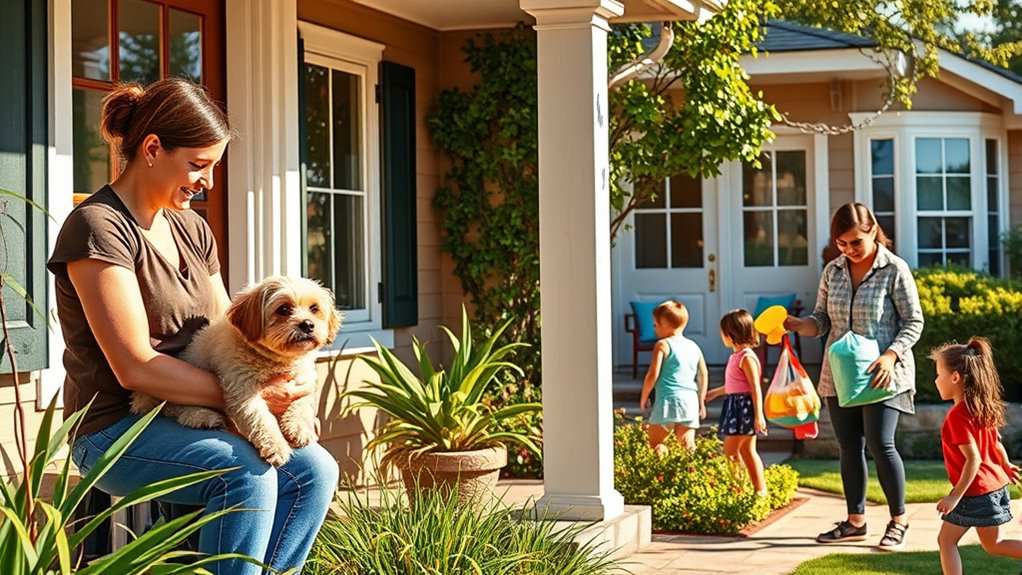Community-based services like pet sitting, house sitting, and neighborhood safety programs help you feel secure and supported. They offer trusted care for your pets and home, especially when you’re away, while also strengthening neighborhood bonds. These services encourage responsible pet ownership and shared responsibility, creating a safer and more connected community. If you want to discover how these programs benefit you and your neighbors, there’s more to explore ahead.
Key Takeaways
- Community-based pet sitting offers trusted care, companionship, and safety for pets when owners are away.
- House sitting programs involve neighbors checking homes for security, maintenance, and emergencies.
- These services foster stronger neighborhood relationships through mutual support and shared responsibilities.
- Community pet care supports vulnerable populations like seniors and disabled residents with reliable assistance.
- Overall, such initiatives promote safer, more connected, and resilient neighborhoods through collective effort.

Have you ever wondered how communities support their most vulnerable members? It’s often through a network of local services designed to guarantee everyone’s well-being. One essential area where community-based services shine is pet care. For many people, pets aren’t just animals; they’re family. When someone needs to leave town or simply can’t care for their furry friends temporarily, community programs step in with pet sitting services. These services offer more than just feeding and walking; they provide companionship, comfort, and peace of mind. Knowing that a trusted neighbor or a dedicated pet sitter is looking after your pet keeps you from worrying while you’re away. These community-driven pet care options also promote responsible pet ownership by encouraging regular attention and emergency preparedness. Incorporating community-based services into your routine can also help ensure that pet care complies with local regulations and standards.
Community pet care ensures pets are loved, cared for, and safe when owners are away.
Alongside pet care, home security is another key aspect of community-based services. When residents need to be away for extended periods, they want to feel secure in their homes. Many communities coordinate neighborhood watch programs or have volunteers who can check in on homes periodically. These efforts help prevent burglaries and vandalism, creating a safer environment for everyone. Some programs even offer home security checks, where volunteers verify that windows and doors are secure, lights are on or off as needed, and mail or packages aren’t left piling up. This kind of community involvement fosters trust and a shared sense of responsibility, making everyone feel safer in their daily lives.
These services aren’t just about safety—they’re about building relationships. When neighbors look out for each other’s pets and homes, it creates a supportive environment where everyone feels valued. You might find yourself exchanging keys with a trusted neighbor or offering to watch a pet in return. This mutual assistance reduces stress and helps maintain stability for those who might otherwise struggle alone. Community-based pet care and home security services also serve as a safety net for seniors, disabled individuals, or anyone facing mobility challenges. They ensure these residents aren’t isolated and that their needs are met with compassion and reliability.
In essence, these services reinforce community bonds and provide essential support that might not be available otherwise. They allow you to go about your daily routines, knowing that your pets are being cared for and your home is under watchful eyes. This collective effort creates a more resilient neighborhood, where everyone’s well-being is a shared priority. By participating in or benefiting from these community-based services, you’re not just taking care of your immediate needs—you’re helping to foster a safer, more connected environment for everyone around you.
Frequently Asked Questions
How Do I Ensure the Safety of My Pet During Community-Based Services?
To guarantee your pet’s safety during community-based services, you should verify the sitter screening processes and ask about their pet safety protocols. Make sure they are experienced, trustworthy, and communicate clearly. Share detailed instructions about your pet’s needs, allergies, and emergency contacts. Stay in touch regularly, and consider providing your vet’s contact information. Trust your instincts and choose sitters with positive reviews and proper credentials for peace of mind.
What Qualifications Should I Look for in a Pet Sitter or House Sitter?
You should look for a pet or house sitter with valid pet care certifications, demonstrating their expertise and commitment. Make certain they’ve undergone thorough background checks to confirm trustworthiness and safety. Ask for references and experience, especially with your pet’s specific needs. A qualified sitter will communicate clearly, show professionalism, and prioritize your pet’s well-being, giving you peace of mind knowing your pet is in capable hands.
Are Community-Based Services Insured or Bonded for Damages?
Think of community-based services like a safety net—you want to make certain it’s sturdy. Many providers carry insurance coverage and bonding policies that protect you against damages or accidents. For example, I once used a pet sitter who was bonded, and when my pet accidentally damaged furniture, I was reimbursed quickly. Always ask about their insurance coverage and bonding policies to ensure you’re fully protected.
How Do I Handle Emergencies or Unforeseen Situations With Sitters?
You should establish clear emergency protocols and maintain open sitter communication from the start. If an emergency arises, contact your sitter immediately to assess the situation and follow your established protocols. Make sure your sitter knows how to reach you and has access to necessary emergency contacts. Regular check-ins during the service also help you stay informed and ensure your pet or home is safe, even during unforeseen situations.
What Are the Costs Typically Associated With Pet Sitting and House Sitting?
Like a trusty steed in a time of yore, pet and house sitting costs vary. You’ll find flexible pricing structures and service packages tailored to your needs, ranging from hourly rates to daily or weekly fees. Depending on the scope, expect to pay anywhere from $15 to $50 per visit for pet sitting, and house sitting can cost $50 to $150 per day. Always compare options to find the best fit.
Conclusion
Imagine walking through a neighborhood where neighbors watch over your home and pets, creating a tapestry of trust and care. With community-based services like pet sitting and house sitting, you’re surrounded by friendly faces ready to lend a hand. Feel the warmth of knowing your loved ones are in caring hands, while you enjoy peace of mind. These services turn your worries into a comforting hug, making your community feel like a second family.









